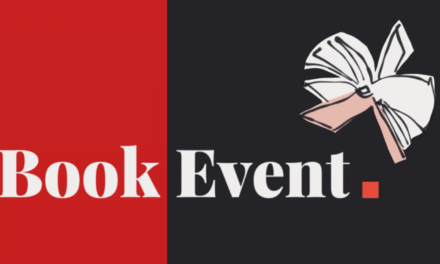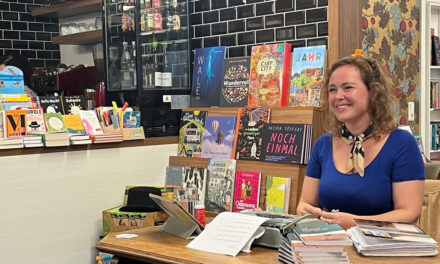Post 3 of 4: The Uneasy Future of Publishing, as Told at CrimeFest 2025
If you’d asked me what I expected from CrimeFest, “existential dread about the future of publishing” wouldn’t have been high on the list. But sure enough, across panels, hallway chats, and late-evening pub debates, one theme kept reappearing: uncertainty. About writing. About publishing.
About the very nature of storytelling in an age of AI, algorithms, and international tariffs.
It wasn’t the focus of every conversation — but somehow, it still felt like the undercurrent of the entire event.
The AI Cloud
AI wasn’t invited to CrimeFest, but it showed up anyway.
Sometimes it was mentioned offhandedly — as a concern for editors or booksellers. Other times, it took center stage. Almost every panel I attended, regardless of topic, circled back to it in some way.
The mood was clear: everyone hates AI, and no one knows what’s coming.
There’s a creeping anxiety about the rise of publishers and platforms promising to produce entire catalogs of AI-generated fiction. At one point, someone mentioned a company whose model involved publishing only AI novels, and not just a few — they planned to release hundreds, all of which would be (they claimed) “guaranteed bestsellers.”
Cue the scoffing.
I wish I could remember the publisher’s name or the numbers they were throwing around — but honestly, the math was so absurd, it bordered on parody. It made me wonder whether anyone at that company had ever even read a book, let alone tried to write or market one.
Everyone I spoke to — authors, editors, reviewers — was in agreement: this isn’t innovation, it’s pollution.
Tariffs and Trickledown Trouble
Politics also crept into the panels — especially when it came to the practical side of publishing. Several authors mentioned the impact of U.S. tariffs, particularly under Trump-era policies that have lingered in one form or another.
The knock-on effects? Higher printing costs, unpredictable international rights deals, delayed shipments, limited bookstore stock. It’s made everything harder — especially for debut and midlist authors, the ones who aren’t backed by a seven-figure contract.
I hadn’t fully appreciated just how connected the book-to-film pipeline is to global politics. But the creatives at CrimeFest made it clear: everything is connected. A paper shortage in Europe, a tariff change in the U.S., an AI tool scraping content in China — it all eventually lands on the desk of someone trying to write a good book and get it into the hands of readers.
The Panel That Gobsmacked Me
Of all the panels I attended, one in particular left me gobsmacked — and, if I’m honest, more than a little heartbroken.
It featured five authors from different sub-genres:
- A fantasy murder mystery
- A serial killer thriller
- A Golden Age-style mystery
- A cozy
- A psychological suspense novel
Each author had a completely different tone, voice, and audience. They were each represented by different publishers. And yet, they’d all experienced the same thing:
Their original book titles had been rejected in favor of algorithm-generated ones.
Let that sink in.
Each author shared the titles they’d come up with themselves — and for the most part, I thought they were smart, evocative, even a little daring. These were the kinds of titles that would make me turn a book over and read the back cover. They had personality.
But their publishers said no. Now that “marketing AI” is part of the publishing process, titles are chosen based on what will maximize SEO, social performance, and click-through rates. All five authors ended up with near-identical titles, varying only in the fill-in-the-blank:
- Murder at [Something] House
- Death at [Something] Manor
- The Mystery of the [Insert Setting]
Titles so bland, so interchangeable, so utterly beige — I would have assumed they were paperbacks from the early ’80s, repackaged and quietly reissued. I wouldn’t have looked twice. Not because the books weren’t good, but because the titles told me nothing.
What bothered me most was this: the originality of these books had been flattened by a machine designed to serve trends rather than readers. And the authors had little choice in the matter.
As a creative person, this made me deeply uneasy.
Writing Into the Future
It’s a strange time to be a writer. We’re told to build platforms, study market trends, and feed the algorithm — all while protecting our voices, preserving our craft, and avoiding burnout. CrimeFest made that tension feel both very real and very personal.
And yet, in spite of all this, the event wasn’t grim. It was honest. Writers aren’t giving up — they’re adapting, resisting, reinventing.
The creativity is still there. The fire is still there. And frankly, the best writing still comes from humans — full of nuance, contradiction, and perspective. No AI can replicate the feeling I had watching five writers quietly mourn their lost titles, even as they cracked jokes about it.
We’re not done yet. Not even close.



